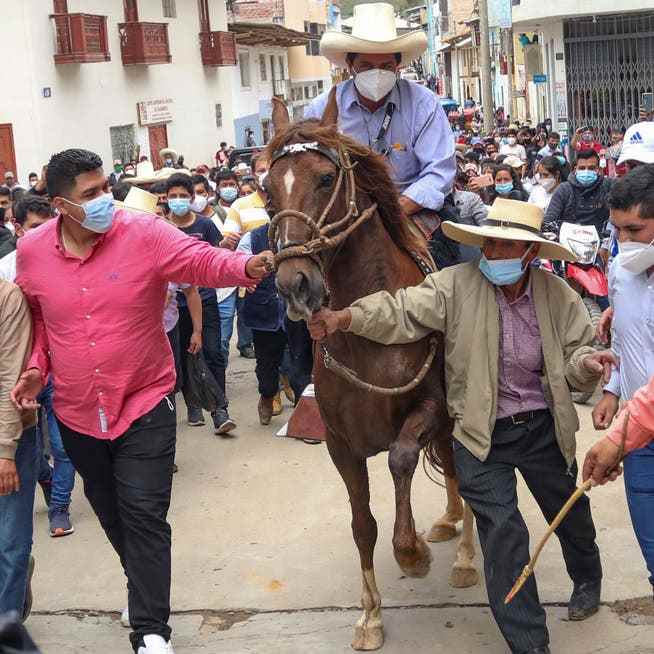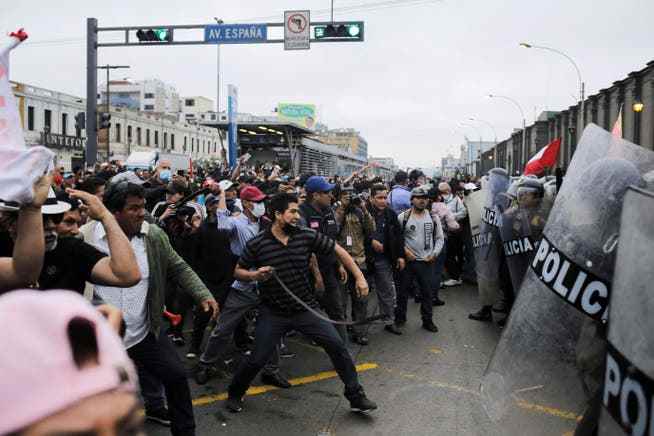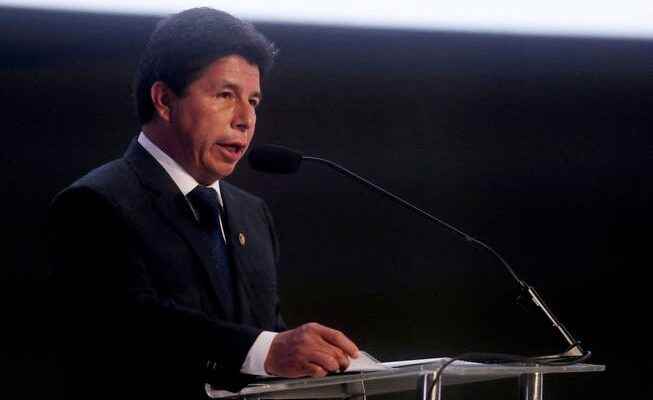The president wanted to forestall his dismissal by dissolving parliament – and in so doing antagonized his own followers. Vice President Boluarte is now taking over as the sixth head of state in four years.
Peru’s President, Pedro Castillo, dissolved parliament on Wednesday. He was then dismissed by the deputies.
Peru does not come to rest. The political turmoil of recent years reached a new high on Wednesday. Parliament voted by a large majority to oust leftist President Pedro Castillo and installed Vice President Dina Boluarte as his successor. Boluarte, 60, is the first woman to lead the South American country and the sixth head of state in just four years. Castillo was arrested on Wednesday afternoon (local time). On Thursday morning, after a hearing, the Supreme Court ruled that he must remain in custody until at least Tuesday until Castillo. Accordingly, the ousted head of state is being investigated on suspicion of rebellion and conspiracy.
Castillo only briefly answered yes or no to questions at the hearing. His lawyer, former justice minister and cabinet minister Aníbal Torres, argued that Castillo was arbitrarily ousted from the presidency. According to the Peruvian newspaper “El Comercio”, a court in the capital Lima dismissed a detention review complaint.
The public prosecutor of the South American country holds Castillo an attack on the constitutional order. Prosecutor Marco Huamán argued in the hearing that the detention was necessary to determine who else took part in the alleged rebellion and to prevent Castillo from fleeing to another country.
Peru’s political class is considered highly corrupt, and scandals have rocked the country for years. Two of Castillo’s predecessors were also forced out of office through impeachment proceedings.
No-confidence motion following allegations of corruption
Because of allegations of corruption against Castillo, Parliament scheduled a vote on a no-confidence motion against the President for Wednesday a few days ago. Castillo had assured on Tuesday that he would respect the constitution and face the vote of no confidence. Early on Wednesday morning, the President then surprisingly announced the dissolution of Parliament. He also ordered a night curfew. From now on, Castillo said he would rule the country by decree, but held out the prospect of new elections and a new constitution.
MPs from the opposition and representatives of the military then spoke of a coup attempt by the president. Many of his ministers resigned. Even MPs from the governing parties opposed the President, as did his Vice-President.
The vast majority of parliamentarians then voted in favor of Castillo’s removal on the grounds of “moral incompetence”: 101 members of Congress voted yes, 6 no, and 10 abstained. Vice-President Boluarte automatically became the head of state. After being sworn in, she spoke out in favor of a dialogue between the divided political forces.
A political amateur in the highest office of state
The former village school teacher and Marxist union leader Castillo was surprisingly elected president in June 2021. In an extremely close runoff, he prevailed against right-wing populist Keiko Fujimori, the daughter of ex-President Alberto Fujimori.
Even then, observers considered him incapable of governing the politically torn and unstable country. He lacks political experience and support in parliament. In the capital, Lima, Castillo was ridiculed as a hillbilly. His campaign appearances with a horse and an oversized hat seemed symbolic of this.

In April 2021, Pedro Castillo rode a horse to the ballot box in Cajamarca to cast his ballot.
Castillo rose to national attention in 2017 as the leader of a teachers’ strike. The left-wing politician comes from the poor mining province of Cajamarca and never held public office until he was elected president. His reign was characterized from the start by chaotic administration and political instability.
Constant government reshuffles prevented the implementation of his educational and social reform agenda. At the end of November, Castillo appointed his fifth cabinet, having again changed a number of ministers.
Peru also suffered from the economic consequences of the pandemic, which led to sharp price increases for food and fuel, among other things. Castillo reacted extremely awkwardly to the unrest that this caused. He had to lift a curfew after protests, wasting a lot of political capital in the process. Since taking office, Castillo has also engaged in a power struggle with Congress, in which the conservative opposition has a majority.
She repeatedly accused him of involvement in corruption scandals and “moral incompetence”. Castillo narrowly escaped impeachment twice. There are also several investigations against him, including for influencing promotions in the military and the police and for obstructing the judiciary. When Castillo was accused of leading a criminal organization in October, the opposition made a third attempt to overthrow him. At the time, Castillo spoke of an attempted coup.
Only Castillo himself makes the impeachment possible
Ironically, the 53-year-old has now ended his presidency himself with a staged coup attempt. Political observers had actually assumed that the third attempt at impeachment would also fail. Because the opposition did not seem to get the required two-thirds majority of 87 votes.
It was only through the announced dissolution of parliament that Castillo ensured that the required majority of deputies turned against him. Political observers in Peru were amazed at how inexperienced and impulsive Castillo acted in the power game with parliament.
What will happen to the former president is uncertain. According to media reports, he was on his way to the Mexican embassy in Lima on Wednesday to apply for political asylum. On the way there, however, he was intercepted and arrested by security forces. Demonstrators had already gathered in front of the embassy to prevent Castillo from escaping into the building. The Mexican government criticized the overthrow of the Peruvian president, which was done in the interest of big business. Mexico has been open to granting political asylum to Castillo if he so desires.
After Castillo’s arrest, there were rallies for and against the ousted president in Peru’s capital Lima. In the meantime, security forces have cordoned off the presidential palace and the congress in the capital. In the interior of the country, too, there are said to have been the first isolated unrests. It is still unclear whether there will be major protests. The new President Boluarte expressed the hope that there would be a new political beginning in Peru. For this she received the support of the American government and the Organization of American States (OAS) on Wednesday.

